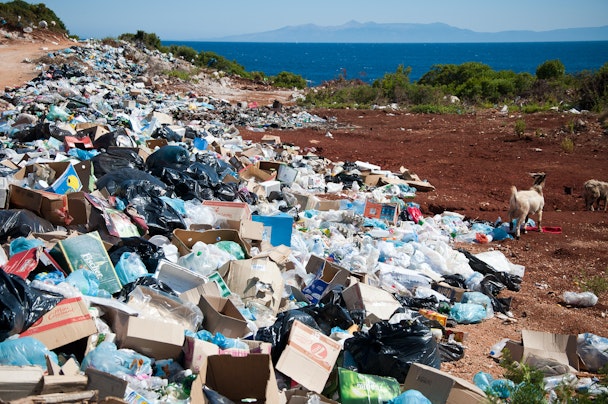What is advertising’s role in the climate crisis?
With both Cop27 and Ad Net Zero wrapping last week, the marketing industry is paying more attention to its role in the climate crisis. But what is that role, and what should it be? We asked seven industry leaders.

What role does advertising play in the climate crisis? / Antoine GIRET via Unsplash
A recent report found that advertising adds 32% to individuals’ carbon footprints. Some industry figures have made radical proposals, such as a windfall tax for marketers. But what does the rest of the industry think about its own responsibilities and capacities for change? We asked seven leaders from The Drum Network.
Ben Essen, global chief strategy officer, Iris
I was lucky enough to be there in Egypt, speaking ahead of the launch of the industry’s latest Advertised Emissions data. The headline is an 11% rise in emissions that need to halve by 2030 – a stark post-pandemic reminder that business-as-usual marketing will accelerate us in the wrong direction. We can’t blindly rely on client net zero pledges to reduce our impact for us.
I also got to hear first-hand Africans speaking about the devastating impact on their lives of a crisis they didn’t create, and their sense of powerlessness to stop it. Loss and damage is a big theme from Cop: this isn’t just about CO2, but damaged lives and lost identities. We need to start telling these stories.
As communicators our job is to start joining the dots. We need to help the public see the connections between climate and race, gender and human rights. The climate crisis is the canvas on which all the world’s challenges are happening. We do still have the power to change it.
Tom Dore, global head of production and sustainability, Across the Pond
I’d love advertising for high carbon-emitting products or services to have similar disclaimers to the alcohol, gambling and tobacco industries. Or something akin to the red, orange and green system that we’ve now become familiar with on food packaging.
Take the recent British Airways: A British Original campaign. Potential travelers are offered 500 reasons to hop on a plane: “to feed the social feed”; “olives the size of your fist”; “because French boys.” It’s intended to be fun and relatable, but the broader impact is that it normalizes flying for frivolous, rather than more meaningful, reasons. It promotes a consumer decision entirely at odds with what our planet desperately needs.
Imagine if that ad was mandated to have a disclaimer: ‘the average European flight contributes 0.3 metric tons of carbon dioxide equivalent to your carbon footprint’ or ‘flying from London to Paris emits 14 times more carbon than traveling by train.’
Sure, it’d ruin the minimal art direction. But these reminders would help consumers remember that their decisions have an impact, and ultimately help to drive sustainable behavioral change.
Advertisement
Nita P Woods, sustainability strategy director, Radley Yeldar
It’s unsurprising to see climate front-and-center right now. Much like every other pressing sustainability issue, environmentalists believe it should remain there all year round. In the run-up to Christmas, I find advertising particularly abhorrent. Most brands encourage us to indulge in every way while downplaying the non-commercial joys of the festivities: time with people you love; helping those with less than you.
These brands could have a greater impact by investing in genuinely effective sustainability strategies, rather than telling us who they have partnered with for their Christmas ad campaign. While Cop is about public policy and systemic change, corporate sustainability needs to be less about lofty aspirations and more about their tangible progress toward goals that support the planet, not just their investors.
I sit on the ASA Council. Last month it banned a series of misleading HSBC adverts that failed to disclose the bank’s contribution to the climate crisis. While we still see far too few adverts promoting degrowth (Patagonia’s infamous Black Friday ad was more than a decade ago), I’m proud to be part of a system that now forces companies to be transparent about their role in the world emerging around us. Only in the face of humble acknowledgment will I be more supportive of (and connected to) ads telling me what they’re doing about the climate crisis.
Charlie Bennett, head of client services, Media Bounty
The climate crisis pits the limited impact of the individual against the collective indifference of the masses. Meanwhile, consumers and businesses alike have more immediately visible threats to their quality of life.
Short-term economic performance rules in a capitalist market, but as brand-builders we can look to the future. So often we achieve financial objectives by appealing to emotion and identity, and by normalizing the aspirational.
Individuals know they won’t change the world by going electric, but if the masses want to do it anyway, businesses will never ignore a growing market. Collectively, advertising has the power to influence from the bottom up.
We can represent the world we want to live in.
Advertisement
Joanna Yarrow, founding partner, M&C Saatchi Life
Advertising can play a huge role in creating new climate-positive norms: showing an inspirational vision of a lower-carbon future and celebrating the products, services and behavior changes that can help make it a reality.
But as well as promoting better ways of life, we also need to move away from clients that aren’t serious about being part of the solution.
Not enough of us can genuinely say we know the impacts of the products and services we sell on planet and people; that we know our clients are genuinely committed to positive change, with a vision for a sustainable version of their business that they’re acting on with urgency. As an industry we need to accept greater responsibility for the things we sell and ask harder questions about the types of businesses we choose to work with. It’s why we apply a three-step filter process to steer decisions about the briefs we take on, because we want to put our skills towards accelerating positive solutions rather than prolonging planetary problems.
Natalie Plowman, senior strategist, Earnest
49% of marketers are wary of sustainability campaigns, afraid of being accused of ‘greenwashing.’ When talking about the climate crisis in B2B, we’ve seen a reliance on goal-setting as the main vehicle for climate communications. Goals create a seemingly safe space where brands can commit to desire rather than action. This has made sourcing responsible providers even more challenging, putting more distance between brands and customers. ‘Greenwishing’ is the new ‘greenwashing.’
Rather than focusing on goals, marketers should see this as an exercise in brand authenticity and an opportunity to get closer to customers by opening up about their climate action – and inaction. They should welcome increased scrutiny for their work and feel comfortable talking about sometimes-uncomfortable truths. You can’t be ‘called out’ for something you’ve already called out yourself.
Suggested newsletters for you
Hannah Thompson, head of programmatic and above-the-line, Tug
As a high-polluting industry, it’s completely fair to have more scrutiny over our sustainability efforts. In practical terms, though, independent agencies struggle with the realities of net-zero advertising. While we’re often able to choose to work with challenger brands with strong environmental bona fides, there is some painful truth to the saying ‘climate consciousness is a luxury for the rich.’
Even with all the good intentions in the world, some companies cannot afford to turn down business. As we head into a recession, many agencies don’t have room in their lean budgets to pursue a B-Corp certification and clients won’t necessarily pick up the tab for efforts like carbon calculation and offsetting.
Independent agencies need a space to come together and share ideas on how to achieve sustainability goals without breaking the bank. This can’t be a singular process; we’re not going to get through this crisis without industry unity.
Content created with:

Tug Agency
Tug is a performance driven, global digital marketing agency, optimised to grow ambitious brands, through the smart combination of data, media, content and technology.
Our...

Earnest
Earnest is the award-winning B2B marketing agency that’s chasing out the humdrum in London and New York.
Why is B2B treated like the poor cousin to B2C?...

M&C Saatchi Group
We are a creative company with five specialist Divisions, connected through data, technology and culture, to deliver Meaningful Change for clients.
Find out more
Iris
We know safe is dangerous. We work with ambitious clients to create a bold way forward out of change, challenge and disruption.
Find out more
Across the Pond
We’re a global, independent creative agency helping tech brands create a better world. How? We make the complex, human.
Find out more
Radley Yeldar
Radley Yeldar is an award-winning, independent, London and Birmingham-based creative consultancy. Our 200-strong team of specialists has been helping to create a...
Find out more
Media Bounty
We’re Media Bounty. And we’re working to become the UK’s leading ethical independent creative agency by 2026.
Our team delivers award-winning strategy,...

